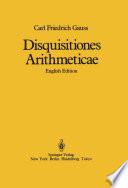
“But in our opinion truths of this kind should be drawn from notions rather than from notations.”
About the proof of Wilson's theorem. Disquisitiones Arithmeticae (1801) Article 76

The Disquisitiones Arithmeticae is a textbook of number theory written in Latin by Carl Friedrich Gauss in 1798 when Gauss was 21 and first published in 1801 when he was 24. It is notable for having had a revolutionary impact on the field of number theory as it not only turned the field truly rigorous and systematic but also paved the path for modern number theory. In this book Gauss brought together and reconciled results in number theory obtained by mathematicians such as Fermat, Euler, Lagrange, and Legendre and added many profound and original results of his own.
“But in our opinion truths of this kind should be drawn from notions rather than from notations.”
About the proof of Wilson's theorem. Disquisitiones Arithmeticae (1801) Article 76
Problema, numeros primos a compositis dignoscendi, hosque in factores suos primos resolvendi, ad gravissima ac utilissima totius arithmeticae pertinere, et geometrarum tum veterum tum recentiorum industriam ac sagacitatem occupavisse, tam notum est, ut de hac re copiose loqui superfluum foret. … [P]raetereaque scientiae dignitas requirere videtur, ut omnia subsidia ad solutionem problematis tam elegantis ac celebris sedulo excolantur.
Disquisitiones Arithmeticae (1801): Article 329